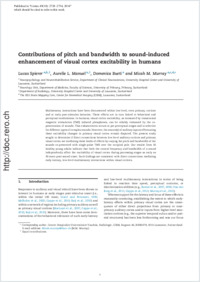Contributions of pitch and bandwidth to sound-induced enhancement of visual cortex excitability in humans
- Spierer, Lucas Neuropsychology and Neurorehabilitation Service, Department of Clinical Neurosciences, University Hospital Center and University of Lausanne, Switzerland - Neurology Unit, Department of Medicine, University of Fribourg, Fribourg, Switzerland
- Manuel, Aurelie L. Neuropsychology and Neurorehabilitation Service, Department of Clinical Neurosciences, University Hospital Center and University of Lausanne, Switzerland
- Bueti, Domenica Neuropsychology and Neurorehabilitation Service, Department of Clinical Neurosciences, University Hospital Center and University of Lausanne, Switzerland
- Murray, Micah M. Neuropsychology and Neurorehabilitation Service, Department of Clinical Neurosciences, University Hospital Center and University of Lausanne, Switzerland - Department of Radiology, University Hospital Center and University of Lausanne, Switzerland - The EEG Brain Mapping Core, Center for Biomedical Imaging (CIBM), Lausanne, Switzerland
-
19.01.2013
Published in:
- Cortex. - 2014, vol. 49, no. 10, p. 2728–2734
English
Multisensory interactions have been documented within low-level, even primary, cortices and at early post-stimulus latencies. These effects are in turn linked to behavioral and perceptual modulations. In humans, visual cortex excitability, as measured by transcranial magnetic stimulation (TMS) induced phosphenes, can be reliably enhanced by the co-presentation of sounds. This enhancement occurs at pre-perceptual stages and is selective for different types of complex sounds. However, the source(s) of auditory inputs effectuating these excitability changes in primary visual cortex remain disputed. The present study sought to determine if direct connections between low-level auditory cortices and primary visual cortex are mediating these kinds of effects by varying the pitch and bandwidth of the sounds co-presented with single-pulse TMS over the occipital pole. Our results from 10 healthy young adults indicate that both the central frequency and bandwidth of a sound independently affect the excitability of visual cortex during processing stages as early as 30 msec post-sound onset. Such findings are consistent with direct connections mediating early-latency, low-level multisensory interactions within visual cortices.
- Faculty
- Faculté des sciences et de médecine
- Department
- Médecine 3ème année
- Language
-
- English
- Classification
- Biological sciences
- License
-
License undefined
- Identifiers
-
- RERO DOC 209510
- DOI 10.1016/j.cortex.2013.01.001
- Persistent URL
- https://folia.unifr.ch/unifr/documents/303376
Statistics
Document views: 113
File downloads:
- pdf: 247
